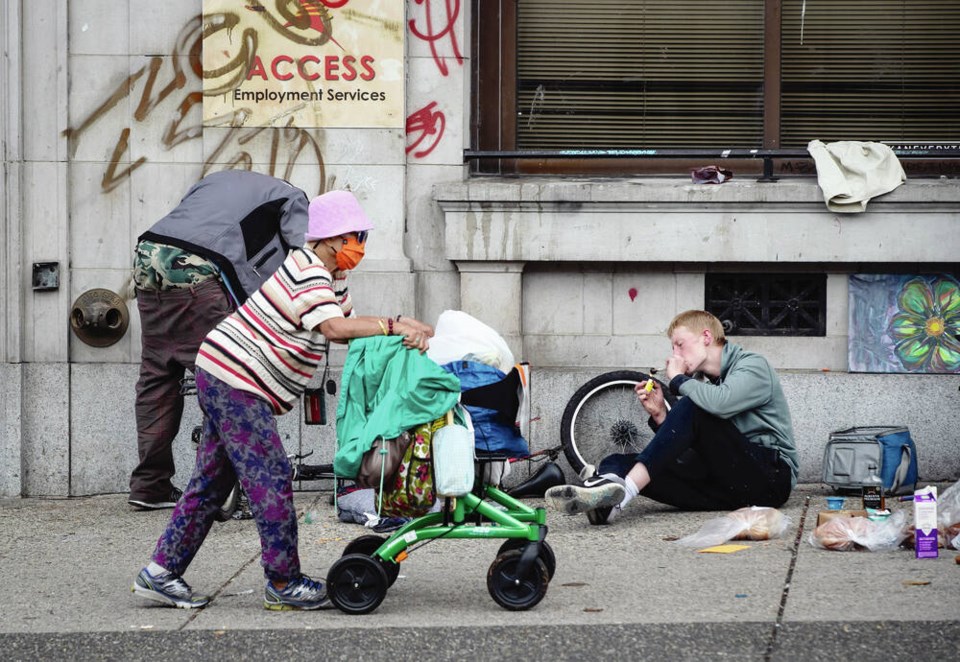As B.C. municipalities struggle with how best to respond to decriminalization of possession of small amounts of illicit drugs, Campbell River is making another attempt to restrict public drug consumption.
This time, the city is relying on a section of the Community Charter that allows councils to make rules around nuisances and disturbances.
It aims to ban consumption in places where it would “negatively interfere with the public’s use and enjoyment of such places,” a staff report said.
The proposal moves away from a previous plan for a city-wide ban, to focus on a more limited geographic area — high-use zones and places frequented by children, families and tourists.
It would prohibit consumption of drugs within 15 metres of playgrounds, sports fields, tennis courts, picnic shelters, water parks, skate parks and covered bus shelters.
The prohibition would also apply to city hall, the community centre, the sportsplex, Spirit Square, the Centennial Building, Robert Ostler Park, the library, Tidemark Theatre, Centennial swimming pool, the museum, the maritime heritage centre and the Discovery fishing pier.
The bylaw would allow RCMP and municipal bylaw officers to ticket offenders.
Council has allocated $82,000 to hire another bylaw officer to deal with an increased workload.
In February, the province began a three-year pilot project permitting people to carry up to 2.5 grams of controlled substances for personal use.
The same month, Campbell River council scrapped proposed bylaws that would have banned drug consumption on city property after hearing from the local public health officer that the plan would have negative public health impacts.
The city also faced a legal challenge from the advocacy group Pivot Legal Society.
Elle Brovold, Campbell River chief administrative officer, said Friday that community safety and downtown revitalization are priorities for council, which wants to create an environment where people feel safe in publicly owned spaces.
Council has heard from residents, businesses and visitors who say they don’t feel comfortable when people consume drugs in certain public areas, which can at times lead to disruptive behaviours, prompting them to avoid these areas, she said.
Kamloops council similarly voted on April 11 to prohibit the consumption of controlled substances on city facilities, roads, parks and public spaces, although a formal bylaw would need ministerial approval and consultation with public health authorities.
BC United Leader Kevin Falcon said this week that he supports communities like Campbell River, Kamloops, Sicamous and Kelowna that are preparing draft bylaws to ban the use of drugs in public spaces, adding the Health Ministry should get behind them.
Falcon noted that people can’t smoke or drink alcohol in playgrounds, beaches and parks, “but don’t worry — you can go there and do all the drugs you want openly in front of families and children.”
Falcon said the “guardrails” the province said it would put in place for the three-year pilot project — access to drug treatment on demand, for example — are not in place.
(Neither the NDP, nor the Liberal government before them until 2017, has been able to provide free readily accessible residential drug treatment in the province).
Falcon said his party “100 per cent” supports municipalities that want to protect their children and communities by creating bylaws prohibiting open drug use in parks, beaches and playgrounds, for example.
He cited the case of a Nanaimo girl who recently found a bag of fentanyl on a school playground and took it home before her parents seized it.
Both the NDP and Liberals supported the province’s application to Health Canada for a decriminalization pilot. Last year, they co-wrote and endorsed an all-party health legislative committee report calling for decriminalization.
Provincial health officer Dr. Bonnie Henry and chief coroner Lisa Lapointe say decriminalization is one tool to reduce the stigma around drug use and to reduce the fear of arrest that drives people to use drugs alone where they can’t be helped if they overdose.
Mental Health and Addictions Minister Jennifer Whiteside has said a wide variety of tools and actions are needed to address the crisis.
But Falcon said the province needs to recognize the current course of action is not working — there were almost 600 deaths because of the toxic drug supply in the first three months of this year — and make a “dramatic shift” toward treatment and recovery.
>>> To comment on this article, write a letter to the editor: [email protected]



